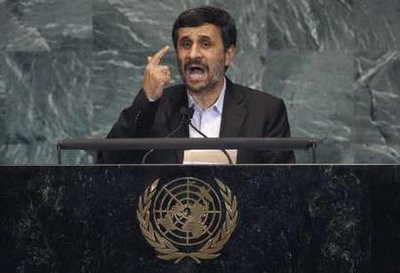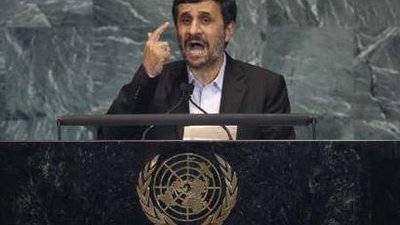US walks out on Ahmadinejad’s UN speech
Source: news.yahoo.com

Iran’s hardline President Mahmoud Ahmadinejad provoked yet another controversy Thursday saying a majority of people in the United States and around the world believe the American government staged the Sept. 11 terror attacks in an attempt to assure Israel’s survival.
The provocative comments prompted the U.S. delegation to walk out of Ahmadinejad’s U.N. speech, where he also blamed the U.S. as the power behind U.N. Security Council sanctions against Iran for its refusal to halt uranium enrichment, a technology that can be used as fuel for electricity generation or to build nuclear weapons.
Delegations from all 27 European Union nations followed the Americans out along with representatives from Australia, New Zealand, Canada and Costa Rica, an EU diplomat said.
Ahmadinejad said the U.S. has allocated $80 billion to upgrade its nuclear arsenal and is not a fair judge to sit as a veto-wielding permanent member of the Security Council to punish Iran for its nuclear activities. Iran denies it is seeking a nuclear weapon.
The Iranian leader — who has in the past cast doubt over the U.S. version of the Sept. 11, 2001, attacks — also called for setting up an independent fact-finding U.N. team to probe the attacks. That, he said, would keep the terror assault from turning into what he has called a sacred issue like the Holocaust where "expressing opinion about it won’t be banned".
Ahmadinejad did not explain the logic behind blaming the U.S. for the terror attacks but said there were three theories:
_That a "powerful and complex terrorist group" penetrated U.S. intelligence and defenses, which is advocated "by American statesmen."
_"That some segments within the U.S. government orchestrated the attack to reverse the declining American economy and its grips on the Middle East in order also to save the Zionist regime. The majority of the American people as well as other nations and politicians agree with this view."
After Ahmadinejad uttered those words, two American diplomats stood and walked out without listening to the third theory: That the attack was the work of "a terrorist group but the American government supported and took advantage of the situation."
Mark Kornblau, spokesman of the U.S. Mission to the world body, issued a statement within moments of the walkout.
"Rather than representing the aspirations and goodwill of the Iranian people," he said, "Mr. Ahmadinejad has yet again chosen to spout vile conspiracy theories and anti-Semitic slurs that are as abhorrent and delusional as they are predictable."
Ahmadinejad said the U.S. used the Sept. 11 attacks as a pretext to invade Afghanistan and Iraq, killing hundreds of thousands of people. He argued that the U.S., instead, should have "designed a logical plan" to punish the perpetrators and not occupy two independent states and shed so much blood.
He boasted of the capture in February of Abdulmalik Rigi, the leader of an armed Sunni group whose insurgency in the southeast of Iran has destabilized the border region with Pakistan. He praised Iranian security forces for capturing him in an overseas operation without resorting to violence. Rigi was later hanged.
Ahmadinejad’s attacks on the United States and the dispute over Iran’s nuclear program dominated the opening of the General Assembly’s annual ministerial meeting.
Secretary-General Ban Ki-moon warned kings, prime ministers and presidents in his keynote address of the growing political polarization and social inequalities in the world and implored U.N. members to show greater tolerance and mutual respect to bring nations and peoples together.
"We hear the language of hate, false divisions between `them’ and `us,’ those who insist on `their way’ or `no way,’" he said.
In times of such polarization and uncertainty, Ban said, "let us remember, the world still looks to the United Nations for moral and political leadership."
President Barack Obama, speaking soon after, echoed the secretary-general, warning that underneath challenges to security and prosperity "lie deeper fears: that ancient hatreds and religious divides are once again ascendant; that a world which has grown more interconnected has somehow slipped beyond our control."
The U.S. president’s 32-minute speech — more than twice the allotted 15 minutes — covered global hotspots from Iran and Afghanistan to the Mideast and North Korea.
Obama said Iran is the only party to the Nuclear Nonproliferation Treaty "that cannot demonstrate the peaceful intentions of its nuclear program" and as a result the U.N. Security Council has imposed four rounds of increasingly tough sanctions.
"The United States and the international community seek a resolution to our differences with Iran, and the door remains open to diplomacy should Iran choose to walk through it," he said. "But the Iranian government must demonstrate a clear and credible commitment, and confirm to the world the peaceful intent of its nuclear program."
Ahmadinejad, speaking in the afternoon session, stressed that Iran will never submit "to illegally imposed pressures" from the U.N. nuclear agency which has been demanding that Tehran halt enrichment, a key Security Council demand as well.
"Iran has always been ready for a dialogue based on respect and justice," he said.
But the Iranian leader said sanctions imposed by the Security Council were illegal and disrespectful.
The General Assembly hall was packed for Obama’s speech, with leaders and diplomats, including Iran’s U.N. Ambassador Mohammad Khazaee, listening carefully, some snapping photos with cell phone cameras. Obama was interrupted twice by applause and received a prolonged and warm response at the end of his remarks.
Just ahead of Obama’s speech, Brazilian Foreign Minister Celso Amorin sharply criticized the United States, saying that the 2003 invasion of Iraq demonstrated that the "blind faith in intelligence reports tailored to justify political goals must be rejected."
"We must ban once and for all the use of force inconsistent with international law," Amorin told the General Assembly, adding that all international disputes should be peacefully resolved through dialogue.
Qatar’s Emir Sheik Hamad bin Khalifa Al-Thani declared that terrorism "should not be treated by waging wars."
He blamed wars fought to combat terrorism for spreading destruction, causing the death and displacement of millions of people "as well as economic and financial crises that shook the stability of the world and undermined the efforts made in dialogue among cultures.
"What we fear is for the war on terrorism to turn into commercial transactions, financial contracts and armies of mercenaries who kill outside of any international and human legitimacy," the emir said. "These are all very dangerous things."
Article from: news.yahoo.com






















